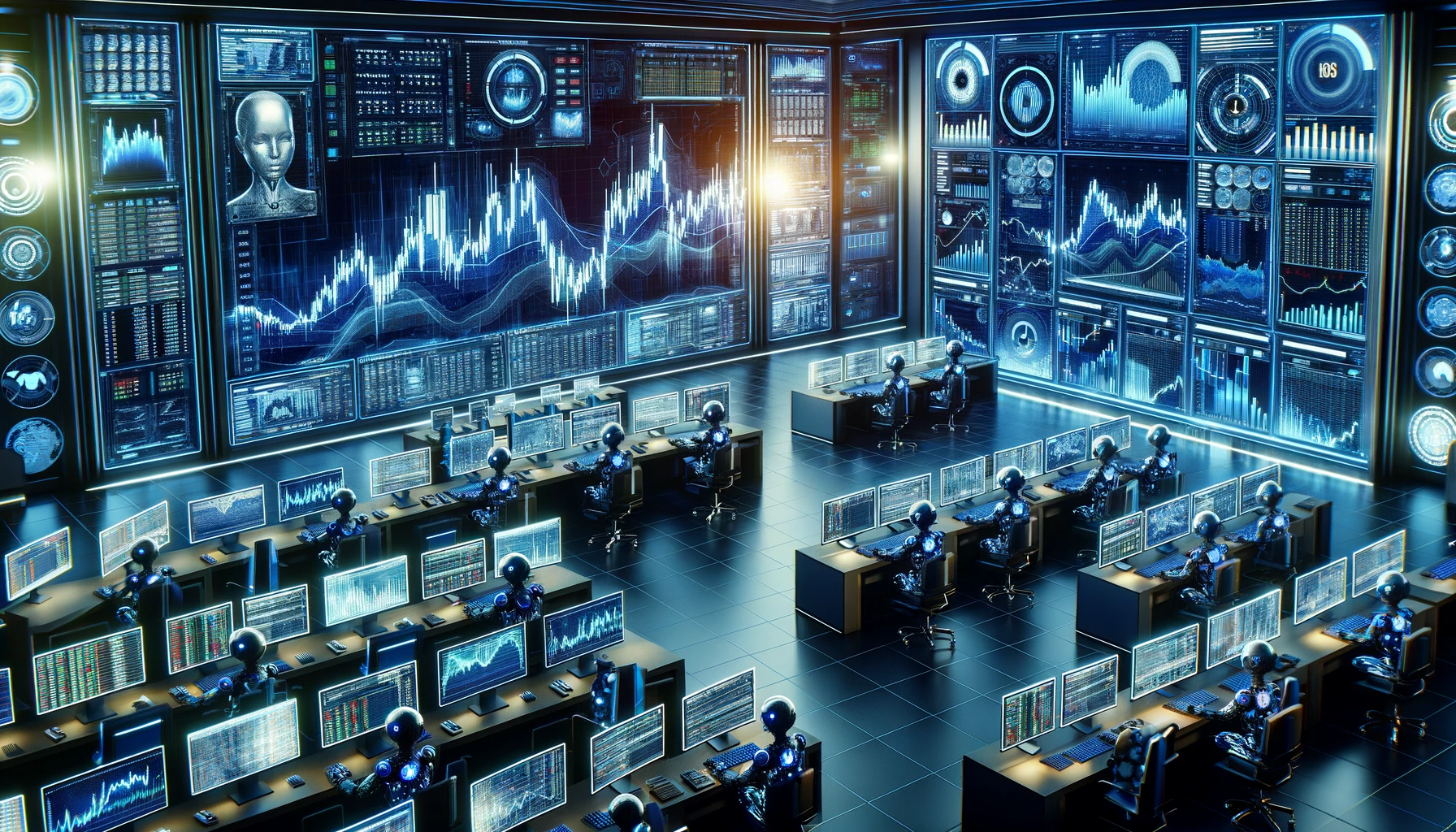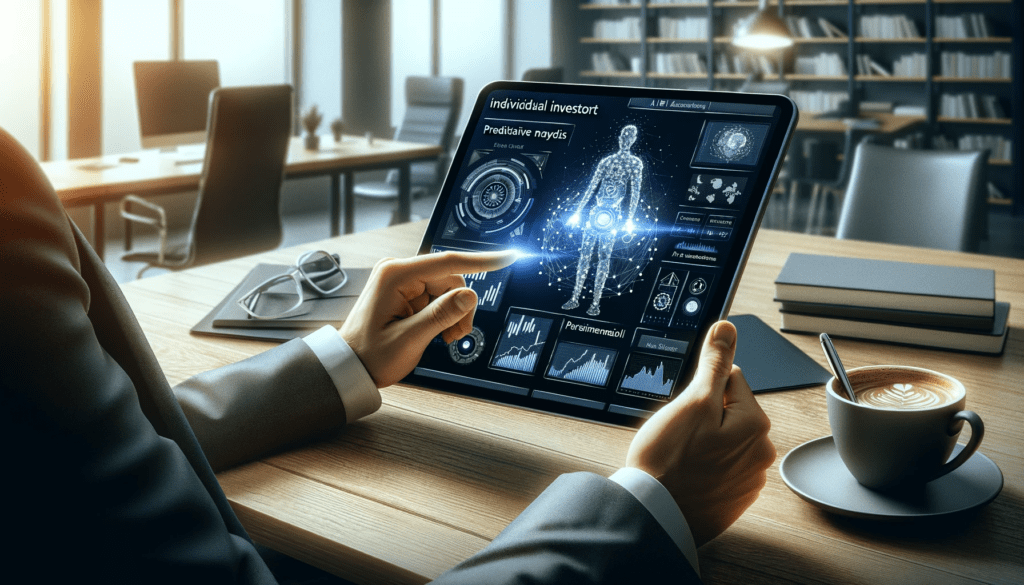The world of finance has long been driven by innovation and technology. From the days of traders shouting on stock exchange floors to the advent of electronic trading, the financial industry has consistently embraced advancements that enhance efficiency and redefine how markets operate. In recent years, a new paradigm has emerged, one where artificial intelligence (AI) takes center stage, reshaping the landscape of stock trading.
This article delves into the realm of AI-powered automated trading and explores its potential to revolutionize stock markets. As we embark on this journey, we seek to answer a pressing question: “Is AI-powered automated trading the future of stock markets?”
The Evolution of Stock Trading
To understand the potential impact of AI-powered automated trading, we must first appreciate the evolutionary path of stock trading itself. Historically, stock trading took place on crowded exchange floors, with traders using hand signals and shouts to execute trades. This traditional method was marked by inefficiencies, delays, and a heavy reliance on human judgment.
However, the advent of electronic trading in the late 20th century changed the game. Trading became more streamlined, and orders were executed with lightning speed. Yet, it was the introduction of algorithmic trading that marked a significant turning point. Algorithms, powered by complex mathematical models, began executing trades automatically, making split-second decisions based on pre-defined criteria.
As technology continued to advance, the financial industry witnessed the emergence of high-frequency trading (HFT), where algorithms executed thousands of trades in milliseconds. This era marked the convergence of technology and finance, setting the stage for AI-powered automated trading systems that could take trading to the next level of sophistication and automation.
Understanding AI in Stock Trading
Before we delve further into AI-powered automated trading, it’s crucial to grasp the essence of artificial intelligence in the context of stock trading. AI encompasses a range of technologies, including machine learning and deep learning, which enable computers to analyze vast amounts of data, identify patterns, and make decisions without explicit programming.

In the realm of stock trading, AI algorithms are designed to process enormous datasets of financial information, including historical price data, market news, economic indicators, and even social media sentiment. These algorithms use advanced mathematical models to identify potential trading opportunities, assess risk factors, and execute trades with precision and speed.
What sets AI apart is its ability to adapt and learn from new data. Machine learning algorithms can continuously refine their strategies based on real-time market conditions and historical performance. This adaptability allows AI-powered trading systems to evolve and improve their decision-making capabilities over time.
The advantages of AI in stock trading are clear: speed, accuracy, and the capacity to process vast amounts of data in real-time. However, the true potential of AI lies in its ability to identify patterns and trends that may elude human traders, providing a competitive edge in an increasingly complex and fast-paced market environment.
As we move forward, we will explore how AI is harnessed in automated trading, its role in driving market efficiency, and the benefits it offers to traders and investors alike.
The Role of Automation in Stock Markets
Automation has become a cornerstone of modern stock markets, and its significance cannot be overstated. At its core, automation in trading refers to the use of computer programs and algorithms to execute buy and sell orders in financial markets. These algorithms are designed to operate swiftly and efficiently, reacting to market conditions in ways that would be impossible for human traders.
The role of automation in stock markets is multifaceted. It not only enhances the speed of trading but also eliminates the potential for human errors and biases. Automation operates 24/7, across global markets, ensuring that trading can occur at any time, taking advantage of opportunities as they arise.
One of the most notable forms of automated trading is high-frequency trading (HFT), where algorithms execute a vast number of trades in fractions of a second. HFT has reshaped market dynamics, with algorithms competing in a race to execute orders at the speed of light. While controversial, HFT has highlighted the immense potential of automation in capturing market inefficiencies.
AI’s Advantages in Automated Trading
Artificial intelligence brings a unique set of advantages to automated trading that significantly differentiates it from traditional algorithmic trading systems. The core advantages of AI in automated trading include:
- Pattern Recognition: AI algorithms excel at recognizing complex patterns in market data that may go unnoticed by human traders. This capability allows them to identify potential trading opportunities and market trends.
- Predictive Analytics: AI leverages historical data and real-time information to make predictive analyses. These predictions aid in decision-making, helping traders choose optimal entry and exit points.
- Adaptability: Machine learning algorithms used in AI continuously learn and adapt to changing market conditions. They refine their strategies based on performance, ensuring they stay relevant and effective.
- Real-time Decision-Making: AI operates in real-time, making split-second decisions based on incoming data. This rapid response time is crucial in capitalizing on market fluctuations.
- Risk Management: AI can assess risk factors and employ risk management strategies automatically, reducing the potential for substantial losses.
Examples of AI-driven trading strategies include sentiment analysis, where AI analyzes social media and news sentiment to gauge market sentiment, and quantitative trading, where AI utilizes mathematical models to identify statistical arbitrage opportunities.
Challenges and Concerns
While the potential benefits of AI-powered automated trading are compelling, it’s essential to acknowledge the challenges and concerns associated with its widespread adoption. Some of these challenges include:
- Market Instability: The speed at which AI operates can lead to market instability, particularly during high-volatility periods. Flash crashes and sudden market swings have raised concerns about AI’s impact on market dynamics.
- Regulatory Oversight: Regulatory bodies are grappling with the need to oversee and regulate AI-driven trading systems. Ensuring fair and transparent markets while accommodating technological advancements is a complex task.
- Ethical Considerations: Questions about the ethical implications of fully automated trading systems persist. The potential for AI-driven decisions to exacerbate market inequalities and amplify market manipulation is a concern.
- System Failures: The reliance on complex AI systems introduces the risk of technical failures, system crashes, and cyberattacks, which could have far-reaching consequences for financial markets.
- Human Oversight: The debate over the role of human oversight in AI-driven trading is ongoing. Striking the right balance between automation and human judgment remains a challenge.

The Future of Stock Markets with AI
As we peer into the future, the role of AI in stock markets is expected to evolve further. The rapid advancements in AI technology, coupled with the increasing availability of big data, are set to reshape the financial industry in several ways:
- Decentralized Finance (DeFi): The rise of DeFi platforms and blockchain technology is poised to revolutionize the way assets are traded and managed. Smart contracts and decentralized exchanges are likely to interact with AI-driven trading systems, introducing new possibilities for automated trading in a decentralized environment.
- AI-Driven Investment Strategies: Investors and asset managers are likely to increasingly adopt AI-powered strategies, including robo-advisors and AI-driven portfolios. These strategies offer personalized investment recommendations and wealth management services.
- Regulatory Frameworks: Regulatory bodies worldwide will continue to adapt to the challenges posed by AI in financial markets. Stricter regulations and guidelines governing algorithmic and AI-driven trading are expected to emerge.
- Market Accessibility: AI is likely to enhance market accessibility for retail investors by offering sophisticated trading tools and analysis previously available only to institutional players.
- Market Surveillance: AI will play a crucial role in market surveillance and fraud detection, helping regulatory authorities identify market abuses and manipulations more effectively.
In conclusion, AI-powered automated trading has already transformed stock markets and is poised to play an even more significant role in the future. While challenges and concerns exist, the potential benefits of improved efficiency, reduced errors, and enhanced market analysis are driving the adoption of AI in stock trading. The future of stock markets is intrinsically tied to the evolution of AI, with both traders and investors poised to benefit from the marriage of technology and finance.
